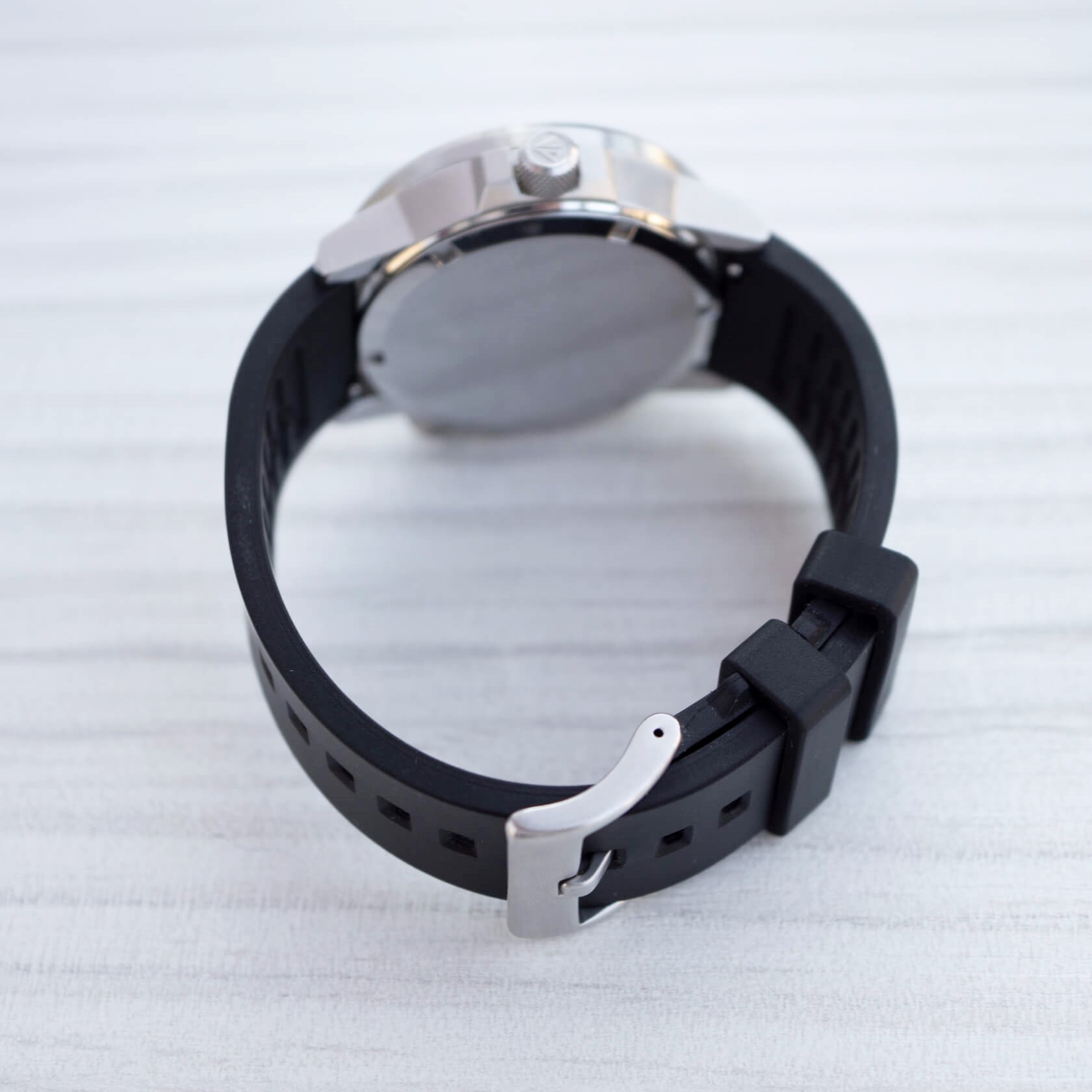Research Discovers "Forever Chemicals" (PFAS) in FKM Watch Straps, Raising Health Concerns
A recent study has uncovered the presence of PFAS "forever chemicals" in common watch straps, including those made from Fluoroelastomers (FKM), raising concerns about potential health risks. The research indicates that these chemicals are more prevalent in watch accessories and everyday products than previously understood.
![]() Nenad Pantelic • January 13, 2025
Nenad Pantelic • January 13, 2025

The study tested a variety of watch bands and discovered that certain types, particularly FKM straps often marketed for their durability and use in high-performance wearables, contained concerning levels of PFAS. This result is alarming since people wearing FKM rubber strap are higlhy exposed to these chemicals through prolonged skin contact.
The Study
Dermal bioavailability of perfluoroalkyl substances using in vitro 3D human skin equivalent models
School of Geography, Earth & Environmental Sciences, University of Birmingham, UK
What are PFAS or Forever Chemicals?
PFAS, or perfluoroalkyl and polyfluoroalkyl substances, are a class of synthetic chemicals used in industrial and consumer products for their water and oil-resistant properties.
Unfortunately, these "forever chemicals" do not break down easily in the environment and can accumulate in the human body over time. Exposure to certain PFAS has been linked to a range of health concerns, including immune deficiencies, liver issues, and some cancers.
The defining feature of PFAS is in the exceptionally strong chemical bonds between carbon and fluorine atoms. But, as mentioned earlier, these bonds make PFAS highly resistant to degradation in both the environment and the human body, earning them the name "forever chemicals".
What are FKM? (Fluoroelastomers)
FKM (Fluoroelastomer) is a type of high-performance synthetic rubber. It is widely used in demanding applications like gaskets and seals in automotive, aerospace, and chemical processing industries.
Fluoroelastomers are well-known for their above-the-average resistance to heat, chemicals, oils, and UV light. These are all the features enthusiasts wish to have in a watch strap.
That is the reason why some strap makers started using FKM. Today there are hundreds of FKM straps designed for dive watches, sports watches, and other tool watches.

Unfortunately for watch people, the result of a study is clear: The concentrations of PFHxA detected were reported to be "many times higher than what has been found in recent studies of cosmetics, food packaging, and school uniforms". While this study focused on smartwatch bands, the findings are pertinent to any watch strap made from fluoroelastomers due to the inherent chemistry of the material.
Understanding Risks From FKM Watch Straps
The discussion around PFAS inevitably leads to questions about potential health impacts. Decades of research have linked exposure to certain PFAS compounds to a range of health concerns.
These include an increased risk of certain cancers (such as kidney, testicular, and thyroid), liver damage, thyroid disease, adverse effects on the immune system, hormonal disruptions, elevated cholesterol levels, and developmental problems in children.
For watch straps, the primary route of potential exposure is dermal absorption or the transfer of substances through the skin.
Several factors specific to how watch straps are worn can influence this potential:
- Prolonged Contact: Watches are typically worn for many hours each day, often continuously, providing an extended period for any chemical transfer to occur.
- Sweat: Perspiration can play a significant role. Studies have suggested that sweat can facilitate the leaching of chemicals from materials and may enhance their absorption through the skin. This is particularly relevant for individuals who wear their watches during physical activity or in warm climates.
- Occlusion: A watch strap worn snugly against the wrist creates an occluded environment (covered and often moist), which can increase the rate at which substances penetrate the skin.
It is also important to consider that any potential exposure from a watch strap contributes to an individual's overall PFAS burden.
Today, people are exposed to PFAS from multiple sources, including personal care items like sunscreen, certain food products, food packaging, and other consumer goods. Each source, even if contributing a small amount, adds to the cumulative load of these persistent chemicals in the body.
Market Implications
The presence of PFAS in watch straps could really shake up the market. For a start, as more people find out about these chemicals, they will probably start looking for straps that do not have them. This could mean more enthusiasts wanting straps made from materials like silicone, leather, or fabric, especially if they're clearly marked as PFAS-free.
This shift in what people want could also kickstart some new ideas in the watch strap world. Companies might start coming up with new, safer materials and ways to make straps without using PFAS. We could see different coatings or new kinds of strap materials that work just as well as FKM rubber but without the same health or environmental baggage.
The forever chemicals issue in watch straps will probably get governments and regulators interested too. They might start looking into how much these chemicals are being used in things we wear and could bring in tougher rules about PFAS in everyday products, like we are seeing in other areas.

This, plus people being more aware, will definitely affect what we think of different brands. Watch strap makers and tech companies could run into trouble if their products contain PFAS.
Being upfront about what is in their products and testing for these chemicals will be very important for keeping customers' trust. One thing to keep in mind, though, is that switching to PFAS-free materials and ways of making things could make straps a bit more expensive, and that cost will definitely get passed on to us, the consumers.
What StrapHunter is Doing On This Matter?
In light of research on PFAS and their potential presence in some watch strap materials (like FKM), we want to share what we are doing and what we think you should know.
Our primary aim is to keep you informed by providing the latest and most accurate information on this topic. We understand that the science around PFAS is still developing, but we believe it is important for you to have the information to make choices that align with your comfort level and health considerations.
Based on current understanding, if you have concerns about PFAS, we advise you to consider choosing a strap made from an alternative material.
We have already put "Buyer Beware" notices in our reviews of FKM rubber straps. It looks like this:
Buyer Beware
Recent research suggests some watch straps, including FKM, may contain PFAS "forever chemicals". Consider alternative materials if you have concerns. We will update this notice as we learn more.
We are monitoring this situation closely, and we are committed to updating you as we get more relevant information.
Update No1: September 4, 2025 new
Not All FKM Straps Are Created Equal. Thankfully.
It is rare to find a company that acknowledges and actively addresses health concerns, especially in an industry where silence is often the norm.
Divecore, a US-based company, is truly stepping up, providing an excellent example of a health-conscious brand that prioritizes quality and customer well-being. We are happy to write about them.
StrapHunter Recommends We at StrapHunter fully recommend Divecore products. Feel free to buy their FKM straps, as they are PFAS-free.
Firstly, they use high-quality, American-made FKM rubber. Secondly, and more importantly, unlike many other straps on the market, Divecore does not add any of the common chemical coatings or repellents to its FKM straps.
For sure, FKM is technically a type of fluoropolymer and falls under the broad "forever chemical" umbrella. But the key is in how it is processed.
Divecore's approach minimizes any potential risks:
- No Added Coatings: They do not spray, treat, or apply any extra water-, oil-, or dirt-repellent chemicals to their straps. The inherent properties of the high-quality FKM are enough.
- A Controlled Curing Process: The only chemical used in their manufacturing is perfluorohexanoic acid (PFHxA), a short-chain PFAS. They use it to ensure the FKM rubber cures and bonds properly. Importantly, PFHxA does not accumulate in the body and is cleared relatively quickly.
- A Highly Stable Material: Once cured, the molecular structure of the FKM is tightly bonded and extremely stable. This minimizes the risk of any chemical release during normal, everyday wear.
The people behind the brand are watch enthusiasts, gear-heads, and divers themselves. They use all their straps personally, and as they say, "We wouldn’t want to expose ourselves or our customers to unnecessary 'forever chemicals'."
Do you know of any other brands that use PFAS-free FKM? Reach out to us, and we will feature them also.